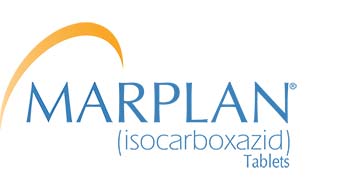- Marplan is available: Please ask your pharmacist for NDC 30698-032-01
- For Healthcare Professionals
- ☰


MARPLAN® (isocarboxazid) Tablets
Don't give up hope:
Even if another antidepressant didn't work,
MARPLAN may help to control your depression
- Learn about how MARPLAN targets 3 key neurotransmitters to help treat your depression
- What you need to know when taking Marplan:
- Dosing Instructions
- Dietary Guide
- Warnings - Lifsa Pharma is committed to ensuring MARPLAN remains available for patients.
Ask your pharmacist for NDC 30698-032-01
MARPLAN is a prescription medicine used to treat people with depression.
Because of its potentially serious side effects, MARPLAN should not be considered as the first choice for the treatment of depression, but should be considered when other antidepressants have failed to control symptoms of depression. You should talk to your healthcare provider about the benefits and risks associated with treatment.
WARNING: SUICIDALITY
MARPLAN is not for use in children and adolescents. Antidepressant medicines such as MARPLAN may increase suicidal thoughts or actions in some children, teenagers, and young adults within the first few months of treatment. Depression and other serious mental illnesses are the most important causes of suicidal thoughts and actions. Some people may have a particularly high risk of having suicidal thoughts or actions. These include people who have (or have a family history of) bipolar illness (also called manic-depressive illness) or suicidal thoughts or actions. You should pay close attention to any changes, especially sudden changes, in mood, behaviors, thoughts, or feelings when taking MARPLAN, especially when starting treatment or when the dose is changed. Call your healthcare provider right away to report new or sudden changes in mood, behavior, thoughts, or feelings.
What is the most important information I should know about MARPLAN?
- Symptoms may worsen with or without MARPLAN. Patients with major depressive disorder (MDD) may experience a worsening of depression and an increased risk of suicide or unusual behavior, both with and without treatment. On a day-to-day basis, patients and their families and caregivers should be alert to the emergence of an increase in symptoms such as anxiety, agitation, panic attacks, insomnia, irritability, hostility, aggressiveness, impulsive behavior, akathisia (inner restlessness), mania, hypomania (a mind in persistent overdrive), worsening of depression, and thoughts of suicide.
- MARPLAN is not for use in treating bipolar depression. You should talk to your healthcare provider about the risks and benefits of starting treatment, as well as your treatment choices for depression and other serious mental illness.
- Low blood pressure, faintness, and significant drowsiness may occur while taking MARPLAN. It is recommended to avoid potentially hazardous tasks, such as driving a car or operating machinery, until you know how MARPLAN affects you.
- Taking MARPLAN with certain drugs and foods may result in dangerous increases in blood pressure. You should have your blood pressure checked on a regular basis while on MARPLAN and promptly tell your healthcare provider if you experience any of the following symptoms:
- headache
- rapid heartbeat
- tightness in the throat or chest
- dizziness
- neck stiffness
- nausea or vomiting
- Avoid foods that contain tyramine while taking MARPLAN. When taking MARPLAN, you need to avoid certain foods that contain a chemical called tyramine because they may interact with MARPLAN and cause serious side effects. Caffeine should also not be consumed in large amounts. A list of foods to avoid while taking MARPLAN is provided below.
Foods you CANNOT eat:
In general, you should avoid foods that are aged to increase flavor.
| Meat, Poultry and Fish | |
|---|---|
|
|
| Beverages | |
|
|
| Dairy (milk products) | |
|
|
| Fruits and Vegetables | |
|
|
| Other | |
|
|
Who should not take MARPLAN?
Do not take MARPLAN if you
- are allergic to isocarboxazid
- have or have had health conditions affecting the brain, heart, or blood vessels
- have high blood pressure
- have or have had recurrent headaches
- have pheochromocytoma
- have or have had liver disease
- have kidney problems
What should I tell my healthcare provider before taking MARPLAN?
Some medications can interact with MARPLAN and cause serious unwanted effects. To avoid these effects, be sure to tell your doctor about ALL of the other medications you are taking, including herbal supplements.
Before you take MARPLAN, tell your healthcare provider if you have any of the following conditions:
- epilepsy
- liver disease
- diabetes
- hyperthyroidism
- mental illness
The most common side effects of MARPLAN include
- dry mouth
- constipation
- nausea
- headache
- sleep disturbance
- dizziness
These are not all the possible side effects of MARPLAN. For more information, ask your healthcare provider or pharmacist. Tell your healthcare provider if you have any side effects that bothers you or that does not go away.
Please refer to the full Prescribing Information for a list of inactive ingredients found at www.marplan.com.
What should I avoid while taking MARPLAN?
- Avoid foods that contain a chemical called tyramine. See the link to the dietary guide above for a list of foods you can and cannot eat while taking MARPLAN.
- Avoid alcoholic beverages
- Avoid caffeine in large amounts
- Avoid taking additional prescription medicines or over-the-counter (OTC) drugs without first consulting with your doctor or pharmacist. Some OTC cough/cold, weight-control, and hay fever/allergy medicines may interact with MARPLAN to cause serious effects.
See the Contraindications section of the full Prescribing Information for a complete list of drugs to avoid.
The risk information provided here is not comprehensive. To learn more, talk about MARPLAN with your doctor or pharmacist. The FDA-approved product labeling can be found at www.marplan.com or 1-866-982-5438.
You may report side effects to the FDA at 1-800-FDA-1088, or at www.fda.gov/medwatch. You may also report side effects to LIFSA at marplan@lifsapharma.com.
MARPLAN is available by prescription only.
Please see the accompanying Medication Guide at www.marplan.com.
